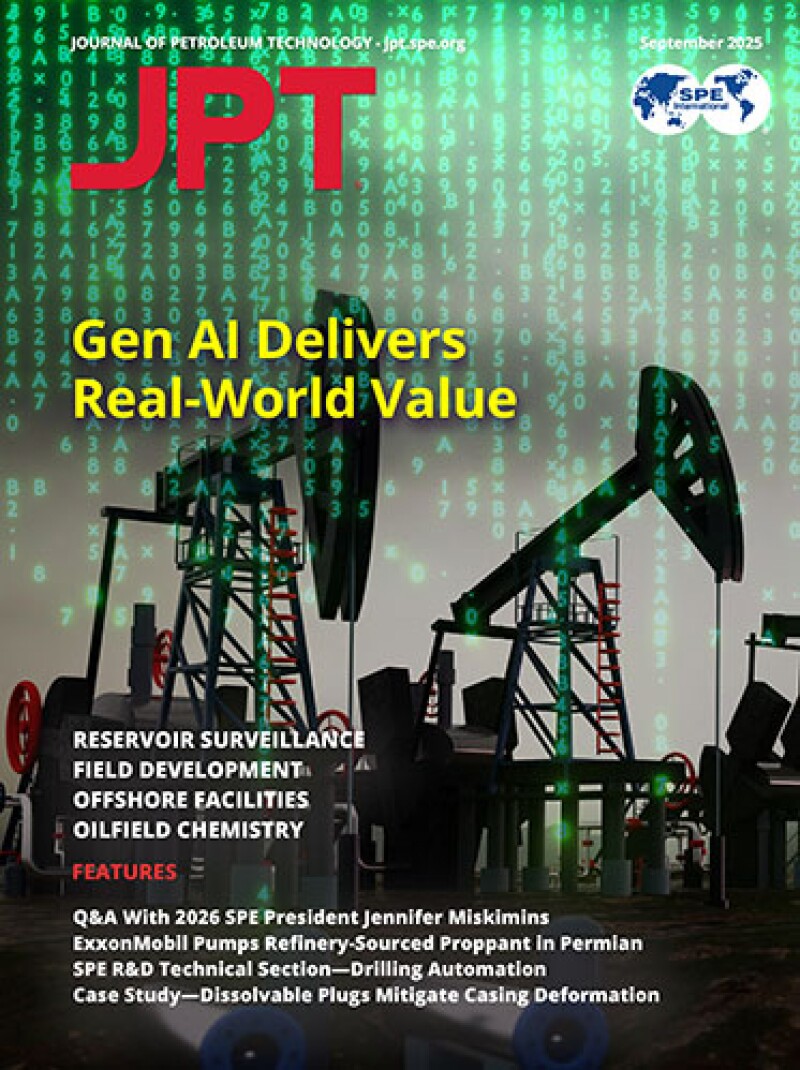JPT September 2025 Issue

On the Cover
Artificial intelligence (AI) and generative AI can offer benefits like massive time savings when it comes to dealing with data, calculations, and repetitive tasks, and they are becoming more powerful and easier to use by the day. Source: IR Stone/Getty Images.
Monthly Features
-
Oil and gas experts encourage human/AI partnerships that can “supercharge” capabilities to create competitive advantages.
-
Jennifer Miskimins will take office as 2026 SPE President during the 2025 SPE Annual Technical Conference and Exhibition in October. She shares her views of the challenges facing our industry and SPE members, her outlook for our industry, and what her goals will be during her presidency.
-
The US supermajor is using one of its lowest-value hydrocarbon products to generate double-digit production increases in its most prolific US asset.
-
This article is the fourth in a Q&A series from the SPE Research and Development Technical Section focusing on emerging energy technologies. In this piece, David Reid, the CTO and CMO for NOV, discusses the evolution and current state of automated drilling systems.
Guest Editorial
-
Intelligent completions could improve many of the world’s oil and gas wells, but not all are suited to the technology. There is another option.
Case Study
-
Casing deformation has emerged as a major challenge in China’s unconventional oil and gas fields, prompting the development of new solutions to address the issue.
Comments
-
SPE members who are in Houston next month can join thousands of peers with a complimentary exhibition pass to ATCE 2025.
E&P Notes
-
Updates about global exploration and production activities and developments.
People
-
This section lists with regret SPE members who recently passed away.
SPE Technical Paper Downloads
-
SPE technical papers synopsized in each monthly issue of JPT are available for download for SPE members for 2 months.
Reservoir Surveillance
-
As of mid-2025, more than 50 CCS facilities are capturing approximately 51 million tons of CO₂ annually, with over 600 additional projects in the pipeline. Yet the success of these efforts rests on a single truth: If we cannot monitor it, we cannot manage it.
Field Development
-
As the exploitation of hydrocarbons moves into increasingly challenging scenarios, the ability to enhance the strength of available tools so that they can create a whole greater than the parts is no longer an option but a necessity. This year’s Field Development selections reflect this need for optimization.
Offshore Facilities
-
The offshore industry is actively embracing a digital-first, low-carbon future, supported by scalable demonstrators, intelligent systems, and integrated engineering approaches now entering precommercial or early-deployment stages.
Oilfield Chemistry
-
The need for sustainable innovation, efficient resource planning, and a greater understanding of subsurface science through applied chemistry is greater than ever. Three papers were selected based on their forward-looking approaches to these challenges.





![JPT_2025-09_GuestEd1_SS_382853197[4].jpg](https://assets.spe.org/dims4/default/b4eb909/2147483647/strip/true/crop/850x478+0+44/resize/320x180!/quality/90/?url=http%3A%2F%2Fspe-brightspot.s3.us-east-2.amazonaws.com%2F8a%2F95%2Fe4e82cb54fd597d497a5b1267f8a%2Fjpt-2025-09-guested1-ss-3828531974.jpg)








